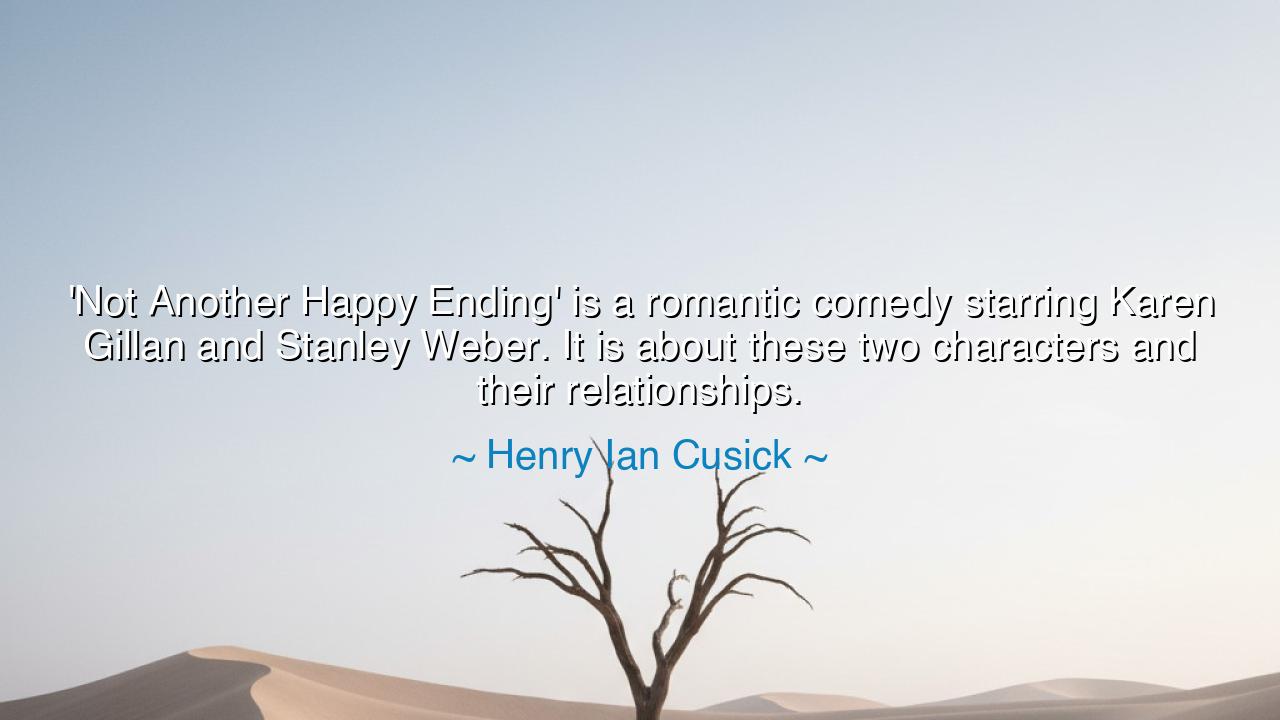
'Not Another Happy Ending' is a romantic comedy starring Karen
'Not Another Happy Ending' is a romantic comedy starring Karen Gillan and Stanley Weber. It is about these two characters and their relationships.






"'Not Another Happy Ending' is a romantic comedy starring Karen Gillan and Stanley Weber. It is about these two characters and their relationships." These words from Henry Ian Cusick invite us into the world of romantic comedy, a genre that, at its heart, seeks to capture the joys and difficulties of human relationships. While this particular film may offer the familiar charm of love, its title, Not Another Happy Ending, speaks to something deeper—the idea that true relationships are not always about the perfect resolution, the happy ending that we expect. Rather, relationships, like all of life, are messy, complicated, and often unfold in ways we do not anticipate. In romantic comedies, we typically expect the grand finale of a perfect love, but this quote hints that the story may not be that simple.
In the ancient world, storytellers and playwrights, such as Sophocles and Euripides, understood that love was not merely a source of joy, but also of conflict and tragic outcomes. In Greek tragedies, love often led to great sacrifices or fates that were far from ideal, revealing the true complexity of human emotion. Euripides, for example, in his play Medea, explored the destructive power of love, where the protagonist, driven by jealousy and betrayal, spirals into violence. Here, love is not the romanticized ideal that we might hope for, but a force capable of causing immense pain and conflict. In contrast, romantic comedies of today, like the one Cusick mentions, often turn this ancient dilemma on its head, wrapping it up in humor and charm, but still, they recognize that love is rarely without its complications.
The idea of the “happy ending” in modern films like Not Another Happy Ending contrasts sharply with tragic love stories of ancient myth, but still carries a powerful truth about human nature. Karen Gillan and Stanley Weber, as the characters of this romantic comedy, navigate the complexities of their own relationships. They are not merely seeking a fairy-tale conclusion but grappling with the realities of connection—the unexpected twists and turns that all relationships face. In essence, the happy ending is elusive because real love is not an idealized or perfected experience. Instead, it is shaped by imperfections, struggles, and growth. The story reflects how love, while still bringing joy, can also present difficult choices and hard truths, making it all the more authentic and relatable.
Consider the story of Romeo and Juliet, whose love was both pure and tragic, unfolding in a time of deep societal conflict. Their deaths, a result of the very passions that once made their love so intense, show how love often transcends the ideal of happy endings. Yet, Shakespeare also delivers a lesson about the transience of love, suggesting that even the most profound emotions can be thwarted by external forces—in this case, the feud between families. Romeo and Juliet are remembered not for their perfect love, but for the depth of their connection and the cost of their devotion, which transcends the boundaries of their families and of life itself.
Even in more contemporary tales, like those of modern romantic films, we see the same underlying themes of growth and resolution. The relationship between Cary Grant and Katharine Hepburn in the classic film The Philadelphia Story offers a more lighthearted take on the idea of complicated love, where misunderstandings and personal growth lead to a joyous reunion. Yet, even in this scenario, the happy ending is not handed over on a silver platter but comes after a journey of self-discovery, missteps, and challenges that make the final union more meaningful. Love in such films is often far more than the culmination of desire—it is the journey that matters, and this journey is not always smooth or perfectly planned.
The lesson in Cusick’s words is one of honesty and authenticity. Relationships, whether they be romantic or otherwise, are not perfect, and the idea that they should always result in “happy endings” is both unrealistic and unhelpful. True love, as depicted in both tragic tales and romantic comedies, requires work, understanding, and compromise. We must be willing to embrace the complexities of human connection and understand that growth and understanding often come through struggle. The idealized happy ending is not always the most rewarding—real fulfillment comes when we are able to navigate the challenges that come with love, rather than expecting an easy resolution.
In our own lives, let us learn from the stories of those who navigate relationships not as a destination but as an evolving journey. We are all challenged by the complexities of love—be it romantic, familial, or platonic—and we must understand that the most meaningful relationships are those that do not aim for perfection but for authentic connection. Whether it is with a partner, a friend, or a family member, commitment and understanding will create the foundation for the love that we seek. Endings, whether happy or otherwise, are less important than the growth we experience along the way. Let us not be swayed by the pursuit of romantic ideals but rather focus on the real work and joy that come from truly living and loving with honesty, dedication, and humility.






AAdministratorAdministrator
Welcome, honored guests. Please leave a comment, we will respond soon